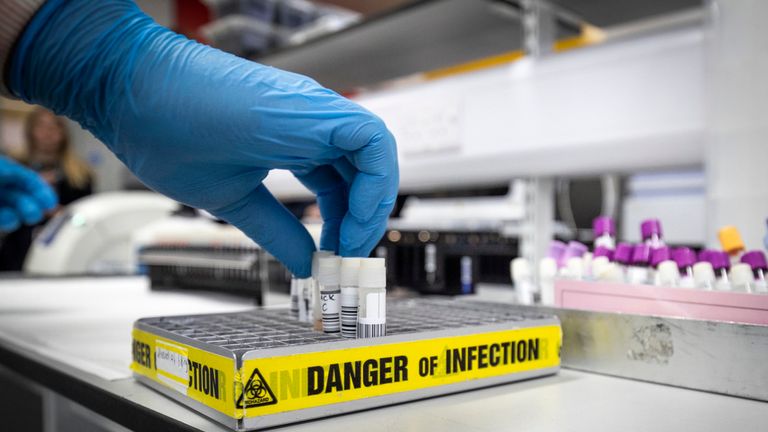Coronavirus: Trials under way for new antibody tests before becoming widely available
The new tests identifies antibodies made in response to the infection, even if people have had mild or no symptoms.
Tuesday 31 March 2020 18:12, UK
One of the first new-style antibody tests for the coronavirus has begun validation trials to prove its reliable enough for widespread use.
Scientists at the Liverpool School of Tropical Medicine are using it to screen samples taken from doctors and nurses on the frontline of the COVID-19 pandemic.
Existing tests detect the virus itself and only work when people are ill.
But the new test identifies antibodies made in response to the infection, even if people have had mild or no symptoms.
Dr Emily Adams, who is leading the trials, said it showed whether someone was in recovery and could allow healthcare workers who are currently self-isolating to return to their jobs.
But first there needs to be proof the test works as intended.
"We need to be sure these tests pick up everyone who has been infected, but also specific. We don't want the test to be positive when they haven't been exposed to the virus," she said.
"If we are telling people that they have been infected and recovered, but in fact they are still vulnerable and do not have immunity to the disease, that is going to be disastrous - especially if they are frontline healthcare workers."
The 10-minute test - made by Mologic - requires just a small finger-prick of blood.
It could be used at home, or at the patient's bedside, with a line appearing in a window on a plastic tray, in a similar way to a pregnancy test.
The government has said it is ordering 3.5 million antibody tests from several developers.
Although healthcare workers will be the top priority, wider testing would allow the economy to start functioning as people are given the all-clear and return to work.
It would in time allow the lockdown to be relaxed while still protecting the vulnerable.
Mologic aims to make 8 million kits a year, at a cost of less than £1 each, and hopes they will be ready to be rolled out by mid-June.
Joe Fitchett, the company's medical director, said: "We need to make sure that if this is developed then it is made available to our most vulnerable and most precious in society - that healthcare workers get access and we don't leave these on the shelf.
"We need to make sure that once these technologies exist we have the manufacturing ability to produce as many as we can in the shortest space of time, but also that we have access to these technologies here in the UK and globally, especially in the lowest resource settings."
:: Listen to the Daily podcast on , , ,
The government has come under fire for not doing enough tests for the virus that causes COVID-19.
The UK lags behind countries like Italy and Germany, but the government says there will be capacity for 25,000 viral tests a day by mid-April.
The antibody test is in addition to that.
Boris Johnson's chief medical officer has warned against rushing it out before it has been shown to be reliable.
Professor Chris Whitty, who is self-isolating after showing symptoms, has said a poor test was even worse than no test at all.







